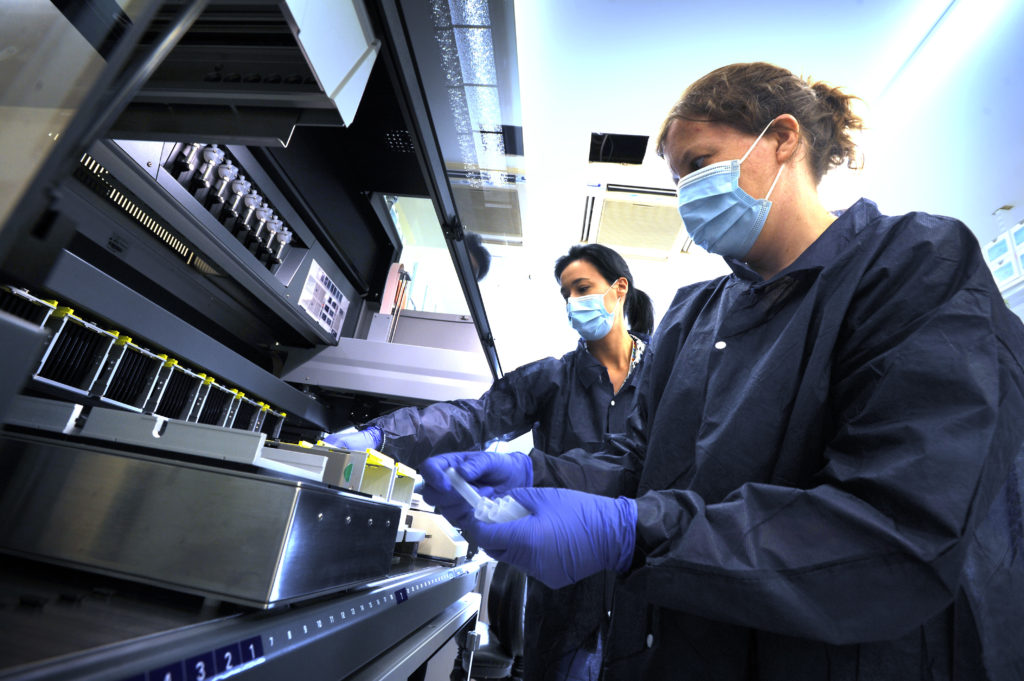A new study suggests that individuals who have previously had COVID-19 are highly unlikely to contract the illness again, for at least six months following their first infection. The study, done as part of a major collaboration between the University of Oxford and Oxford University Hospitals (OUH) NHS Foundation Trust, was published today as a pre-print.

Despite an estimated 51 million people infected with the virus worldwide, with high levels of transmission ongoing, reports of patients becoming re-infected after already having had COVID-19 are rare. However, up until now there have not been any large-scale studies of how much protection from re-infection people get after COVID-19.
The study, part of a major ongoing staff testing programme supported by the NIHR Oxford Biomedical Research Centre and Public Health England, covered a 30-week period (April – November 2020) with 12,180 health care workers employed at OUH. The health care workers were tested for antibodies to the virus that causes COVID-19 as a way of detecting who had been infected before. The hospital tested staff regularly for COVID-19, both when they became unwell with symptoms and also as part of regular testing of well staff. The researchers then followed whether staff who had been infected before had the same number of new COVID-19 infections as those who had not been infected before.
During the study, 89 of 11,052 staff without antibodies developed a new infection with symptoms. None of the 1246 staff with antibodies developed a symptomatic infection. Staff with antibodies were also less likely to test positive for COVID-19 without symptoms, 76 staff without antibodies tested positive compared to just 3 with antibodies. The three healthcare workers with antibodies who tested positive for the virus that causes COVID-19 were all well and did not develop symptoms of COVID-19 again.
This suggests that most people are unlikely to get COVID-19 again if they have already had it in the previous six months. Additionally, the opposite also proved true – health care workers who did not have antibodies against COVID-19 were more likely to develop the infection.
One of the authors on the paper, Professor David Eyre of the University of Oxford’s Nuffield Department of Population Health, said: “This ongoing study involving a large cohort of healthcare workers has shown that being infected with COVID-19 does offer protection against re-infection for most people for at least six months – we found no new symptomatic infections in any of the participants who had tested positive for antibodies, while 89 of those who had tested negative did contract the virus. This is really good news, because we can be confident that, at least in the short term, most people who get COVID-19 won’t get it again.
“We know from a previous study that antibody levels fall over time, but this latest study shows that there is some immunity in those who have been infected. We will continue to follow this cohort of staff carefully to see how long protection lasts and whether previous infection affects the severity of infection if people do get infected again.”
While this is an important step in understanding how COVID-19 immunity may work, it is not enough data at the moment to make a judgement on longer-term protection (beyond six months from the initial infection). The study will continue to collect data, with the goal of verifying how long protection from re-infection might last.
Dr Katie Jeffery, Director of Infection Prevention and Control for Oxford University Hospitals said: “This is an exciting finding, indicating that infection with the virus provides at least short-term protection from re-infection – this news comes in the same month as other encouraging news about COVID vaccines. I would like to thank all our staff who have shown great commitment in attending our clinics for repeated swab and antibody testing in order to keep our patients and each other safe.”
OUH Chief Executive Officer Dr Bruno Holthof said: “Since the outbreak of COVID-19, the Trust and the University have worked closely together to develop highly reliable PCR and antibody testing to support the research and care in the fight against the virus.
“Our comprehensive staff testing programme is revealing a regular stream of valuable information as we try to better understand how to tackle this disease. I’d like to thank all those involved in delivering the programme and the more than 12,000 people who work at our hospitals who have participated.”
Susan Hopkins, Deputy Director, National Infection Service, PHE and one of the study’s authors said: “This study is a fantastic example of how well-structured long-term cohort surveillance can produce hugely useful results. Studies like this one are absolutely vital in helping us to understand how this new virus behaves and what the implications are for acquired immunity. This, as well as Public Health England’s SIREN study, are key to ensuring that we have the information we need to respond to the pandemic in the most effective way.
“I am deeply grateful to my colleagues at the University of Oxford and to all the participants who continue to volunteer to assist us in this critical work.”